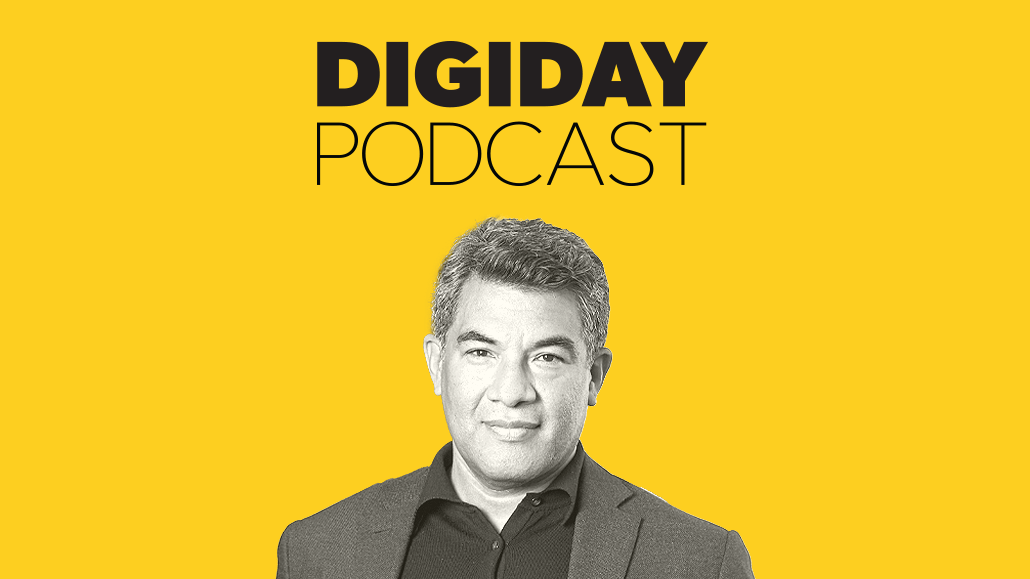Secure your place at the Digiday Media Buying Summit in Nashville, March 2-4
How The Guardian’s Luis Romero is selling the legacy U.K. publication in the U.S.

Subscribe: Apple Podcasts • Spotify
As The Guardian’s fiscal year concludes on March 31, Luis Romero, the publication’s svp of advertising in North America, acknowledged that his team has had a “late start” to receiving RFPs and budget planning with advertisers and agencies for the rest of 2023. However, those conversations picked up in the “last couple of weeks,” with several of last year’s major advertisers starting to talk about renewing deals this year.
Outside of the macroeconomic pressure on advertisers’ budgets, Romero’s team has been challenged by keyword blocklists. Advertisers’ brand safety concerns outweigh the desire to market to news publishers’ large and lucrative audiences, causing them to all but eliminate news content from their programmatic buys. But for advertisers still willing to place ads on news publishers’ sites, like The Guardian, third-party verification firms are added to the equation, putting the publishers through the brand safety ringer to grade how safe and reliable that content ends up being before advertisers are willing to commit.
All this ladders up to The Guardian’s CPMs getting lowered by 25% when content is deemed unsafe, according to Romero on the latest episode of the Digiday Podcast. “Typically [about 1% of] our inventory is flagged for unsafe content on any given day, but when there’s a major news event, like the Syrian-Turkish earthquake, it swells up to 10 to 15%. We lose revenue,” he added.
With the saga of challenges around the programmatic open marketplace persisting — though his team is working with other industry players to try and fix these issues — focusing on direct-sold advertising and programmatic direct in the meantime is the name of the game. In tandem with this strategy, Romero’s team is pushing more sponsorships around tentpole world events and less on breaking news content in order to try and resolve some of the advertisers’ brand safety concerns, as well as upsell them on larger, more cohesive offerings.
Below are highlights from the conversation, which have been lightly edited and condensed for clarity.
Setting up camp at tentpole events
In terms of our direct sales strategy, we’re focusing on world events and we’re trying to sell sponsorships to people that want to align with some of the coverage that we have. One that I’m really excited about — and this is so Guardian-esque — is the World Championship of Chess. When we talk to companies about this, they can see themselves being aligned with this kind of mental agility, strategic thinking sport, and for some companies, that’s the messaging that they want to be in.
The Women’s World Cup [is] going to be a big focus of ours, kind of like these signature tentpole things. I mentioned the World Cup because the Guardian [has] been around for 200 years in the U.K., which puts us roughly starting at around 1820 and soccer was founded in the 1860s. So we literally have been covering soccer, in its formal way, since its inception.
Selling against legacy events for the first time
The Men’s World Cup was the first time that I’m aware of in the U.S. that we actually went to market with a sponsorship opportunity. We had one exclusive partner for that and that got me excited about the Women’s World Cup. Trying to break into the budgets [of these events is difficult] because they are planned so far ahead of time, but I really felt like we had the legacy and the expertise which gave us a right to go after people who want to be associated with the World Cup.
Looking ahead to the Women’s World Cup, I think there’s an opportunity to capture budgets that are being planned right now. And I think because of the economic situation that we may be in, people are really looking for ways to stand out, even if they have less money to spend. And so something like a tentpole event, like the Women’s World Cup, or the World Championship of Chess, is a way for them to really stand out.
Beating the brand safety issue
[Even tentpole sporting events can still have unsafe and undesirable events happening adjacent to them]. We saw that happen firsthand in the men’s World Cup because there was a lot of controversy about where it was being held and how those workers were being treated in Qatar. We certainly covered that, and we were not going to stop covering it, so I think the way we frame it up to our advertisers is that that’s what we’re about. We’re never going to stop covering this and if it’s part of the World Cup — or in the case of chess, a cheating scandal — then that’s going to be part of our coverage. And there’s not one advertiser that hasn’t said, “that’s OK.”
It’s another reason why we like selling and working with advertisers directly, because there’s an opportunity to have a conversation about brand safety and there’s an understanding that happens. So it’s not just a click of the box — there’s a really true understanding of what’s happening contextually in the environment.
More in Media

From feeds to streets: How mega influencer Haley Baylee is diversifying beyond platform algorithms
Kalil is partnering with LinkNYC to take her social media content into the real world and the streets of NYC.

‘A brand trip’: How the creator economy showed up at this year’s Super Bowl
Super Bowl 2026 had more on-the-ground brand activations and creator participation than ever, showcasing how it’s become a massive IRL moment for the creator economy.

Media Briefing: Turning scraped content into paid assets — Amazon and Microsoft build AI marketplaces
Amazon plans an AI content marketplace to join Microsoft’s efforts and pay publishers — but it relies on AI com stop scraping for free.








